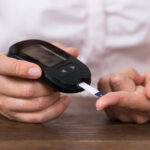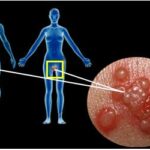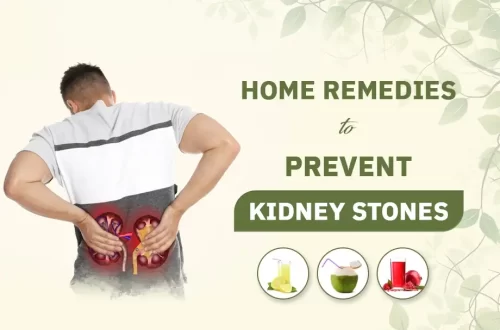Low Blood Sugar (Hypoglycemia)
Before delving into low blood sugar symptoms, understand that low blood sugar, medically known as hypoglycemia or simply a hypo, occurs when the level of glucose in your blood drops below 4 mmol/L.
Prompt treatment is essential to prevent worsening symptoms, but it is often manageable at home.
Contrasting High Blood Sugar
Conversely, high blood sugar is referred to as hyperglycemia, which is characterized by elevated glucose levels in the bloodstream.
Recognizing Low Blood Sugar
Low blood sugar primarily affects individuals with diabetes who use insulin or certain diabetes medications. It is uncommon in people without diabetes.
Symptoms of Low Blood Sugar
Symptoms of hypoglycemia can manifest as:
- Hunger: Feeling an urgent need to eat.
- Dizziness: Sensation of lightheadedness or instability.
- Anxiety or Irritability: Feeling uneasy or unusually tense.
- Sweating: Excessive perspiration, especially noticeable despite normal temperature.
- Shaking: Trembling of the hands or body.
- Tingling Lips: Numbness or tingling sensation around the lips.
- Heart Palpitations: Awareness of heartbeats, possibly rapid or irregular.
- Fatigue or Weakness: Feeling unusually tired or lacking in energy.
- Vision Changes: Blurred or impaired vision.
- Confusion: Difficulty concentrating or understanding.
Severe Low Blood Sugar
In cases of severe hypoglycemia, individuals may experience:
- Seizure or Fit: Uncontrollable muscle contractions or convulsions.
- Loss of Consciousness: Becoming unconscious due to extremely low blood sugar levels.
Managing Low Blood Sugar
Immediate action is crucial when experiencing low blood sugar. Methods to raise blood sugar levels include:
- Consuming fast-acting carbohydrates such as glucose tablets, juice, or sugary snacks.
- If prescribed, administering glucagon, a hormone that raises blood sugar levels rapidly.
Understanding the signs and symptoms of low blood sugar is essential for individuals with diabetes and their caregivers.
Recognizing and promptly addressing hypoglycemia can prevent complications and ensure optimal management of diabetes. Regular monitoring and awareness of individual symptoms help in maintaining stable blood sugar levels and overall health.
How to Treat Low Blood Sugar Yourself
If you have diabetes and experience symptoms of low blood sugar (hypoglycemia), or if your blood sugar drops below 4 mmol/L, follow these steps to manage it effectively:
- Immediate Action:
- Consume a fast-acting source of sugar to raise your blood sugar quickly. Options include:
- A small glass of fruit juice or a sugary fizzy drink.
- 5 glucose or dextrose tablets.
- 4 large jelly babies.
- 2 tubes of glucose gel.
- Consume a fast-acting source of sugar to raise your blood sugar quickly. Options include:
- Monitor Blood Sugar:
- Check your blood sugar levels after 10 to 15 minutes to ensure they are rising.
- Repeat if Necessary:
- If your blood sugar remains below 4 mmol/L, consume another sugary drink or snack and recheck after 10 minutes.
- Longer-Term Management:
- Once your symptoms improve and your blood sugar level is above 4 mmol/L, eat something that will sustain your blood sugar levels, such as biscuits, a sandwich, or your next scheduled meal.
How to Treat Severe Low Blood Sugar
In cases of severe hypoglycemia where a person with diabetes becomes unconscious, follow these emergency procedures:
- Do Not Give Food or Drink:
- It’s crucial not to give anything orally as the person may not be able to swallow safely.
- Recovery Position:
- Place the unconscious individual in the recovery position to ensure their airway remains clear.
- Administer Glucagon:
- If available and you are trained to use it, administer a glucagon injection immediately. This hormone raises blood sugar levels quickly.
- Monitor and Provide Further Support:
- If the person starts to regain consciousness within 10 minutes of receiving glucagon and can swallow safely, offer them food or drink that will help maintain their blood sugar levels.
- Stay with Them:
- Remain with the individual until they have fully recovered, ensuring their safety and monitoring their condition closely.
Knowing how to manage and treat low blood sugar is essential for individuals with diabetes and those around them.
Prompt action, appropriate use of glucose-raising agents, and understanding emergency procedures for severe hypoglycemia can prevent complications and ensure proper care during episodes of low blood sugar.
Regular monitoring and preparedness are key to maintaining stable blood sugar levels and overall health.
How to Reduce Your Risk of Low Blood Sugar
If you take medication for diabetes, particularly insulin, there are steps you can take to minimize the risk of experiencing low blood sugar (hypoglycemia):
Do:
- Follow Your Treatment Plan:
- Adhere to the treatment plan agreed upon with your diabetes care team. This includes adjusting your insulin dosage as necessary based on your blood sugar levels and lifestyle factors.
- Regular Blood Sugar Checks:
- Monitor your blood sugar levels regularly throughout the day, especially before meals, exercise, and bedtime.
- Carry Fast-Acting Sugar Sources:
- Always have items on hand that can quickly raise your blood sugar, such as:
- Sugary drinks like fruit juice or soda.
- Sweets such as candies or glucose tablets.
- Always have items on hand that can quickly raise your blood sugar, such as:
- Have a Glucagon Injection Kit:
- Carry a glucagon emergency kit with you at all times. This kit is crucial for treating severe hypoglycemia if you become unconscious and cannot take oral sugar.
- Wear a Medical ID:
- Wear a medical identification bracelet or necklace that indicates you have diabetes. This helps others recognize your condition during emergencies.
- Educate Family and Friends:
- Ensure that your family members, close friends, or caregivers are familiar with the signs and treatment of severe low blood sugar. They should know how to administer glucagon if needed.
- Consider Continuous Glucose Monitoring:
- Discuss with your diabetes care team the option of using a continuous glucose monitor (CGM) or flash monitor. These devices provide real-time readings of your blood sugar levels, alerting you to fluctuations and helping you take timely action.
- Insulin Pump Consideration:
- If you have type 1 diabetes and frequently experience low blood sugar, inquire with your diabetes care team about transitioning to an insulin pump. Insulin pumps can offer more precise insulin delivery, reducing the risk of hypoglycemia.
Here are some important guidelines related to diet and alcohol consumption for individuals managing diabetes:
- Do not skip or delay meals:
- It’s essential to maintain regular meal times and not skip meals to help stabilize blood sugar levels throughout the day.
- Do not drink too much alcohol:
- Stick to the recommended guidelines, which suggest consuming no more than 14 units of alcohol per week, spread out over at least 3 days. This moderation helps in managing blood sugar levels and overall health.
- Do not drink alcohol without eating:
- When consuming alcohol, always ensure there is food in your stomach. This practice slows down the absorption of alcohol into the bloodstream, preventing rapid fluctuations in blood sugar levels.
Information:
- Blood Sugar Monitoring:
- If you drive, regularly monitor your blood sugar levels. Ensure your blood sugar is above 5 mmol/L before operating a vehicle to maintain alertness and safety.
Following these guidelines can help individuals with diabetes manage their condition effectively, minimize the risk of complications, and maintain a healthy lifestyle.
By implementing these proactive measures, individuals with diabetes can significantly reduce the likelihood of experiencing low blood sugar episodes.
Consistent monitoring, preparedness with emergency supplies, and leveraging advanced monitoring technologies contribute to better management of blood sugar levels and overall diabetes care.
Regular communication with your healthcare team ensures that your treatment plan remains tailored to your specific needs and reduces the risks associated with managing diabetes.
How You Get Low Blood Sugar
If You Have Diabetes
Diabetes is characterized by high blood sugar levels (hyperglycemia), which diabetes medications aim to control. However, these medications, especially insulin, can sometimes lower blood sugar levels too much, leading to hypoglycemia.
Common reasons for experiencing low blood sugar if you have diabetes include:
- Insulin Dosage: Taking too much insulin relative to your current blood sugar level or meal intake.
- Injection Techniques: Injecting insulin repeatedly in the same area can affect absorption, leading to unexpected drops in blood sugar.
- Meal Timing and Content: Skipping or delaying meals, or not consuming enough carbohydrates, which are essential for maintaining blood sugar levels.
- Exercise: Engaging in strenuous physical activity without adjusting insulin dosage or carbohydrate intake to compensate for increased glucose utilization.
- Alcohol Consumption: Drinking alcohol, particularly without eating food simultaneously, can cause blood sugar levels to drop unpredictably.
Sometimes, the exact cause of low blood sugar isn’t immediately apparent and may require adjustments in medication or lifestyle to prevent recurrence.
If You Do Not Have Diabetes
Experiencing low blood sugar without diabetes is uncommon and may indicate underlying medical conditions such as:
- Malnutrition: Severe lack of essential nutrients in the diet, leading to metabolic imbalances.
- Addison’s Disease: A condition where the adrenal glands do not produce enough hormones, including cortisol, which can affect blood sugar regulation.
- Pancreatic Tumors: Rare tumors in the pancreas, such as insulinomas, which produce excessive amounts of insulin, causing hypoglycemia.
Conclusion
Understanding the causes of low blood sugar, whether you have diabetes or not, is crucial for managing your health effectively. For individuals with diabetes, careful monitoring of insulin dosage, meal planning, and lifestyle adjustments can help prevent hypoglycemia.
If you experience recurrent or severe episodes of low blood sugar, consult with a healthcare provider for proper diagnosis and management.
Benefits of Eating Strawberries
Benefits of Eating Pomegranate
Benefits of Eating Strawberries
Benefits of Eating Pomegranate

A graduate of Computer Science and Information Management Technology. Diploma – Caregiving, Certificates – Dementia and Diabetes Awareness and Management. A researcher, blogger, songwriter, singer and acoustic guitarist. Born in an environment where natural talents such as healing are imparted at our natural birth. This natural talents of healing is the result of our genetic inheritance and the training from family environment.













